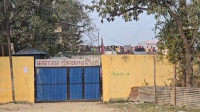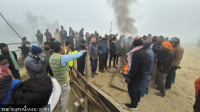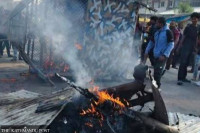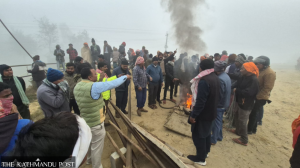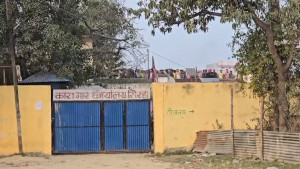Madhesh Province
Deprived and repeatedly duped, Musahars are losing faith in state
The residents of Musahari tole in Dhanusha say party leaders come seeking their votes before every election, but forget about them as soon as they get elected.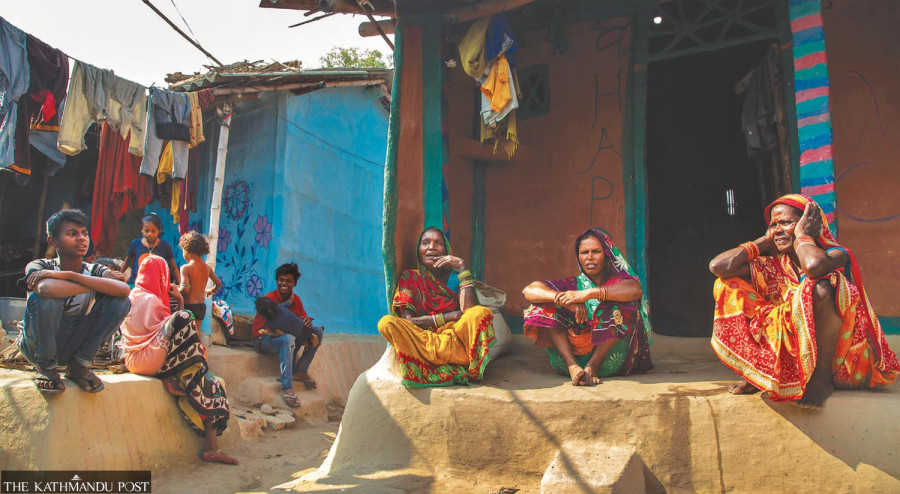
Nishan Khatiwada
The huts made with mud, wood, and hay have been raised a little from the ground to ensure safety from the floods that inundate the Musahari tole every monsoon.
The tole is a settlement of 22 poor Musahar families with a total of 131 members, and falls in ward 3 of Mukhiyapatti Musaharniya Rural Municipality, which is around 15 kilometres from the Janakpur Sub Metropolitan City. The settlement is spread on around three Kattha land (10,935 square feet approximately).
The Musahars have been living in these flimsy huts for generations. And most of the residents do not have land registration certificates for the land their huts occupy.
Leaders change. Elections come and go. The only thing that persists is a life full of miseries and stories galore of neglect by political leaders.
The top leaders of the major parties have included populist agendas in their election manifestos—Rail and Panijahaj [train and ship] have gotten their place. But neither the local leaders nor the known faces of the top political parties from the region care about the Musahari tole and the problems its residents have faced for generations.
The leaders of the political parties have already begun electioneering and they also visit the Musahari tole with their usual tall promises. Are the leaders genuinely bothered or are the Musahars again being seen as no more than vote-banks, the tole residents wonder.
Forty-four-year old Birma Devi Sada’s husband died 12 years ago while working in India. Now she lives on the income of her sons who work in the fields on daily wages. There are days they don’t get any work.

She lives in a congested place along with her three daughters and two sons.
Come elections, politicians visit us asking for votes, but after getting elected, they forget about us and our plight, she says. “We voted for the umbrella symbol [Rastriya Janata Party-Nepal] and the party also won, but they then didn’t do anything for us,” Sada told the Post.
The 22 families share one tube-well for potable water. “But better-off families living nearby got new tubewells under a government grant,” she said.
The Musahars do not have access to a toilet. So they defecate in the open in the nearby fields.
Sitali Sada, another tole resident, has a hut partitioned into three rooms, shared by her three sons and their wives. The mother sleeps on the tarpaulin-covered porch outside.
“Before every election, the leaders always promise to build a house with a bathroom for each of us,” Sitali said. She has difficulty in hearing, but has not sought medical help for the lack of money. “I requested the local leaders for help with treatment, but no one seemed bothered.”
All the families cook food outside their huts, with brushwood collected from nearby fields. And collecting fuelwood is not easy. “We get scolded by the owners for trespassing,” Sitali said.

“Whenever the leaders come to us begging for votes, we ask what they have done for us, to improve our living conditions. They can’t answer and leave,” she added.
Disappointed with their elected representatives, the Musahars try new candidates every time, but get duped each time, they say.
Shail Devi Sada, 60, has a family of 12 sharing accommodation in two huts. Her sons and their wives sleep inside, but she makes do on the porch outside. On rainy nights, she can’t sleep at all.
The Musahars ultimately blame the Nepal government for their sufferings and surmise life would be better if they moved across the border to India.
The Indian government helps Dalits by providing them food and proper houses, they said. “What has our government done for us? Absolutely nothing,” they aver.

“We re-roofed our thatched huts with tiles, but the tiles have also been damaged by a hailstorm,” said Sitali. “The government has not helped us repair them.”
Dukhi Sada, a farm worker, has no time to meet political leaders. “Leaders win, fail to keep their promises, and yet come back to us, trying to trick us every time,” he said. “But our problems remain the same. Our forefathers set up the settlement here by cutting down the forest. But we don’t even have laalpurja [land registration certificate].”
Article 40 (5) of the Constitution of Nepal states that the State shall provide land for one time to landless Dalits.
But no one is sure when the poor Musahars will get land from the State to legally call their own.
Gyan Chand Sada, 70, has some hope that those elected in the November 20 polls will help them build new houses and dig tube-wells. “But we have had a bitter experience. They stop counting us as citizens the moment they win elections,” he says ruefully.




 10.12°C Kathmandu
10.12°C Kathmandu
